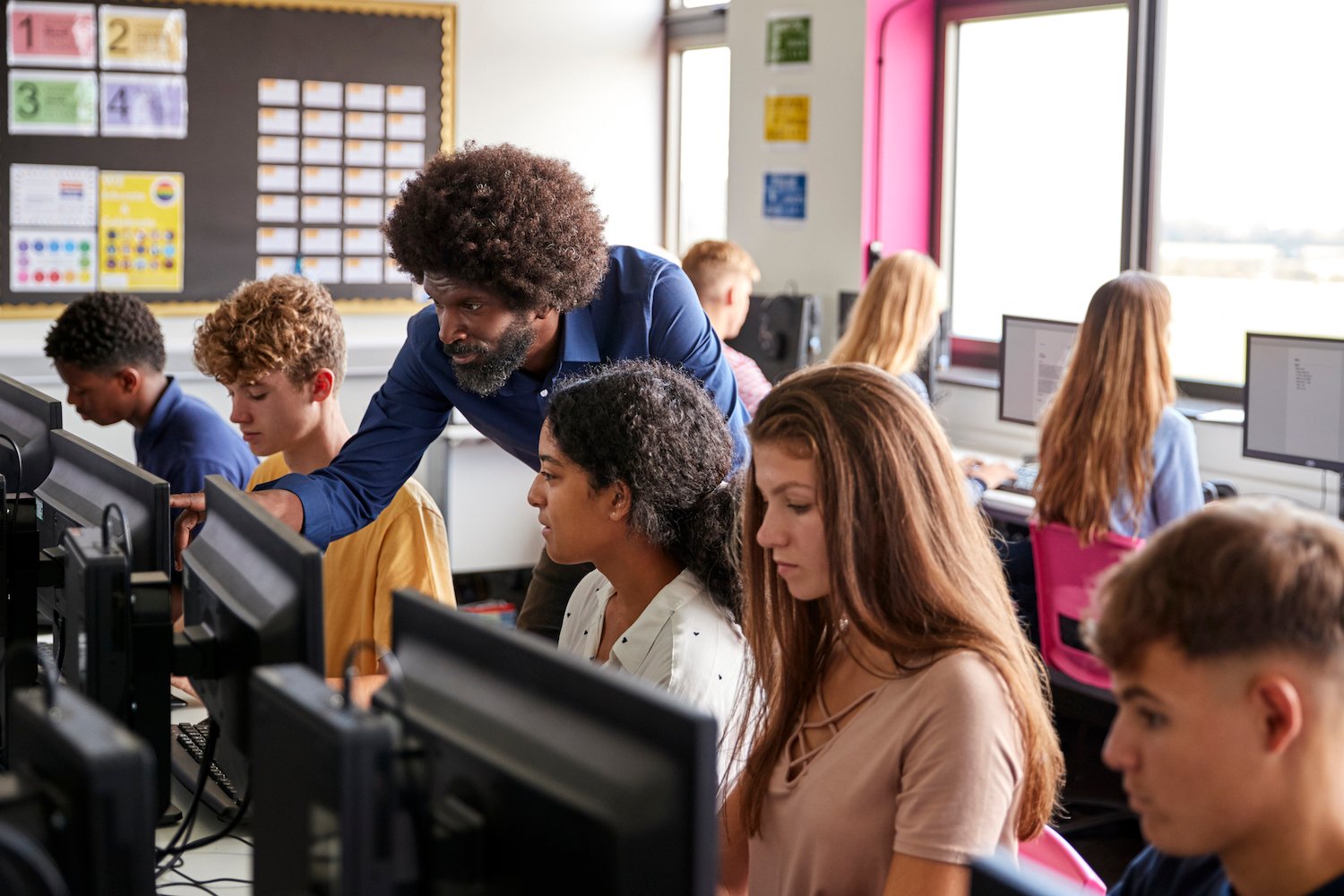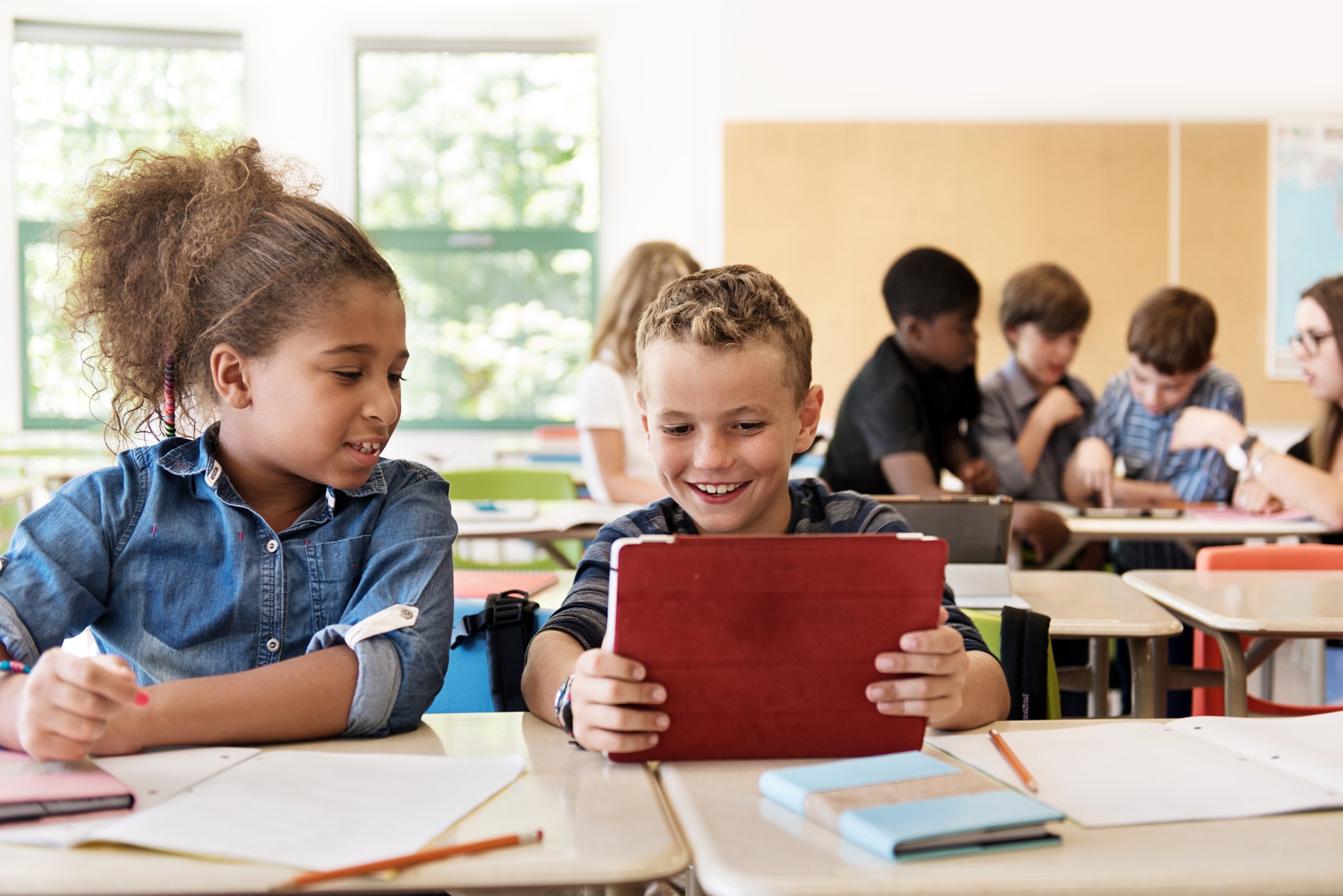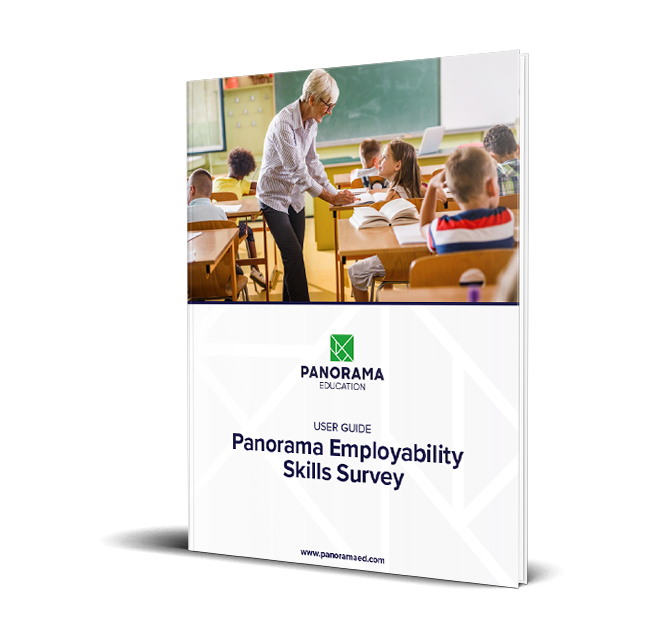In today’s rapidly evolving job market, the blueprint for student success extends far beyond the confines of traditional academic achievements.
It has never been more critical to equip students with a comprehensive skill set that includes both academic knowledge as well as essential employability skills. These skills play a pivotal role in shaping students into adaptable and resilient individuals who are prepared to navigate the complexities of the modern workforce.
In this article, we’ll explore what it means to prepare students for post-secondary success. We’ll also share some questions that you can ask in a student survey to gather insights into their proficiency with employability skills, setting the stage for tailored instruction and support.
Table of Contents:
- What Are Employability Skills?
- Understanding Student Needs with Employability Skills Surveys
- 23 Survey Questions to Measure Students' Employability Skills
- Next Steps for District Leaders
|
Key Takeaways: The Essentiality of Employability Skills
Enhancing Employability Skills Through Assessment
|
What Are Employability Skills?
Employability skills (often referred to as “soft skills”) are competencies that go beyond academic knowledge and technical expertise. They are the foundational skills that enable individuals to engage effectively in the workplace, adapt to changing environments, and interact positively with colleagues and clients. Employability skills encompass a wide range of abilities including communication, teamwork, problem-solving, ethics, professionalism, and the management of resources. Common employability skills include:
- Applied Academic Skills: Skills that are evident in homework assignments, class discussions, and classwork.These include reading skills, writing skills, math strategies, and scientific principles.
- Communication Skills: Expressing ideas and information clearly and effectively, both verbally and in writing. Listening actively to others and engaging in constructive feedback are additional components of communication skills.
- Critical Thinking Skills: Displaying analytical and strategic thinking in assessing and solving a problem, questioning a situation, or engaging in debate and discussion with others.
- Ethics: Upholding strong personal and professional values; demonstrating integrity, responsibility, and a respect for diversity in the workplace.
- Information Use: Retrieving information from any medium (e.g., print, internet, in-person conversation) and using that information for an assignment.
- Interpersonal Skills: Using collaboration and communication skills when working in pairs or teams to complete short- or long-term tasks.
- Personal Qualities: This encapsulates how students participate as a member of the classroom; their willingness to learn; how they communicate with peers and adults; how they contribute to the learning environment; and how they govern themselves.
- Problem Solving Skills: The ability to recognize challenges, analyze situations, and devise and implement effective solutions to solve problems.
- Professionalism: Exhibiting a strong work ethic, reliability, and a commitment to ongoing learning and self-improvement.
- Resource Management: A component of project-based learning and working that involves managing one’s time, resources, and personnel.
- Systems Thinking: Working in-sync with peers to accomplish an assignment or project in a systematic manner.
- Teamwork: Working collaboratively with others towards common goals, respecting different perspectives, and contributing to a positive team environment.
- Technology Use: Understanding and using technology to increase efficiency and effectiveness at a variety of tasks, including collecting and analyzing data, writing reports, and creating presentations.
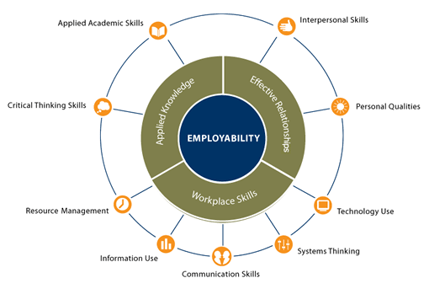
Source: U.S. Department of Education
Employability skills are essential for students as they prepare to enter the workforce or pursue further education. These skills are not just desirable by employers; they are necessary for a fulfilling and prosperous career.
Why Are Employability Skills Important to Teach and Measure?
With a range of challenges facing today’s students as they enter the workforce, the significance of defining, measuring, and building employability skills cannot be overstated.
Unlike job-specific skills, employability skills are transferable across various industries and positions, making them invaluable for students entering the workforce. Recent research highlights the necessity of developing skills such as verbal communication, teamwork, problem-solving, and adaptability among students:
- A number of studies have found that while employers are seeking entry-level employees who possess an array of basic, higher-order, and affective skills, the majority find entry-level job applicants deficient in these employability skills.
- A report from Hanover Research on incorporating soft skills into K-12 cites communication skills, active listening, critical thinking, problem solving, collaboration, and time management all as paramount for post-secondary success.
- When students receive comprehensive preparation that spans a wide array of employability skills, they not only secure better employment opportunities, but also become more engaged citizens. This heightened civic engagement enhances their ability to influence and shape society.
It is clear that employability skills can provide students with the tools they need to excel in diverse job environments. As such, accurately measuring these competencies becomes a pivotal task for educators.
Download Panorama's Employability Skills Student Survey
Understanding Student Needs with Employability Skills Surveys
In order to take meaningful and data-driven action to teach employability skills, educators need to understand the areas of workforce readiness where students need additional support.
Districts and schools can administer employability skills surveys to assess students’ skills in a reliable, valid, and sustainable way. By measuring students’ self-efficacy, social perspective-taking, growth mindset, and grit (among other key skills), teachers and support staff can gain important insights into students’ strengths and areas for growth.
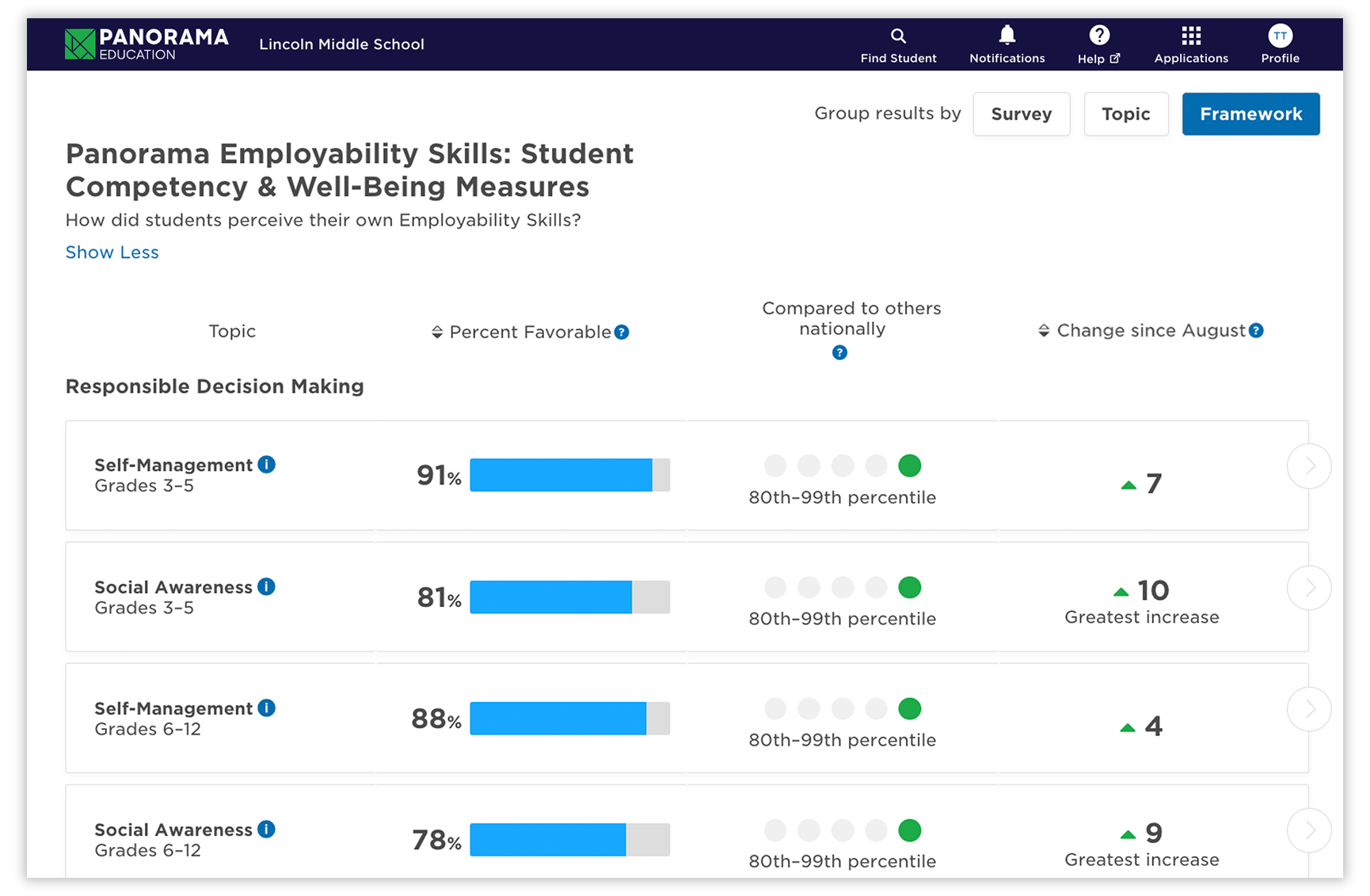
Survey results from Panorama’s Employability Skills Student Survey (demo data displayed)
The data from a student survey can also help surface broader trends for school leaders and district administrators.
23 Survey Questions to Measure Students' Employability Skills
We have highlighted a selection of survey questions from the Panorama Employability Skills Student Survey to consider in your efforts to measure skills aligned to employability. This survey includes over 70 questions across 12 topics—from growth mindset and grit to self-efficacy and social perspective-taking—that can be translated into 12 different languages.
Incorporating this type of survey into your holistic student assessment strategy engages learners in a self-reflective process that fosters personal growth and resilience. Utilizing these survey items with your students serves as an excellent opportunity to identify areas of strength and development, enabling you to tailor educational experiences that enhance their readiness for future employment. You might consider:
- Administering the Panorama Employability Skills Student Survey annually to secondary students (and using results to guide advisory programming)
- Including some of the below questions on an existing school climate or student feedback survey
- Repurposing specific items as reflection prompts for student assignments related to workforce readiness
- Cross-referencing existing curricula with these survey questions to ensure that explicit instruction aligns with the key skills essential for employability
The below questions are developmentally appropriate for students in grades 6-12.
Employability Skills Student Survey Questions
1. During the past 30 days, when working independently, how often did you stay focused?2. How often do you allow others to speak without interruption?
3. How often do you get your work done right away, instead of waiting until the last minute?
4. How carefully do you listen to other people’s points of view?
5. How clearly are you able to describe your feelings?
6. When others disagree with you, how respectful are you of their views?
7. To what extent are you able to disagree with others without starting an argument?
8. How confident are you that you can do the hardest work that is assigned to you?
9. When complicated ideas are presented, how confident are you that you can understand them?
10. When you get stuck while learning something new, how likely are you to try a different strategy?
11. Before you start on a challenging project, how often do you think about the best way to approach the project?
12. How often do you use strategies to learn more effectively?
13. How much effort do you put into getting involved in discussions?
14. How often do you stay focused on the same goal for several months at a time?
15. If you fail to reach an important goal, how likely are you to try again?
16. When you are working on a project that matters a lot to you, how focused can you stay when there are lots of distractions?
17. If you have a problem while working towards an important goal, how well can you keep working?
18. Some people pursue some of their goals for a long time, and others change their goals frequently. Over the next several years, how likely are you to continue to pursue one of your current goals?
19. How often are you able to pull yourself out of a bad mood?
20. When you are feeling pressured, how easily can you stay in control?
21. How often are you able to control your emotions when you need to?
22. When things go wrong for you, how calm are you able to remain?
23. How useful do you think school will be to you in the future?
Next Steps for District Leaders
As district and school leaders navigate the challenge of preparing students for the realities of the workforce and higher education, it's imperative to prioritize the development and assessment of employability skills. By teaching employability skills, we can ensure that students are prepared academically. Additionally, by measuring these skills, we can equip them with the critical workforce readiness capabilities necessary for success in today’s global economy.
|
Frequently Asked Questions 1. What topics are included on the Employability Skills Student Survey? The Employability Skills Survey includes 12 topics, including growth mindset, grit, social awareness, social perspective-taking, self-efficacy, and learning strategies. You can download the survey user guide for a full listing of topics and individual questions. 2. Are Panorama surveys customizable? Yes—we provide partner districts and schools with a variety of tools to help align surveys to state and/or district priorities. Contact us to learn more! |




